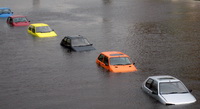New Climate Change Agreement Is Unlikely to Be Achieved
Deutsche Bank AG analysts said, global plans to slow climate change will probably fail through 2020. Nations will require further limits equivalent to total yearly emissions in the U.S.

Analysis of 270 climate policies indicate they won’t keep emissions from rising in 2020 to levels that exceed what is needed to keep temperatures from advancing 2 degrees Celsius (3.6 Fahrenheit), according to analysts including Mark Fulton, global head of climate change investment research at Deutsche Bank’s asset-management division.
China and Germany have lower regulatory risk for investors than the U.S. and the U.K., Deutsche Bank said. The analysis found that Italy has the biggest regulatory risk because it may not be strictly enforcing climate policies, Fulton said today on conference call. “It has got issues around enforcement.”
The first compliance period of the 1997 Kyoto Protocol accord ends in 2012. It requires developed nations to curb emissions by about 5 percent from 1990 levels in the five-year period and laid the groundwork for carbon markets. About 190 nations are working for a December accord in Copenhagen to replace or extend the protocol to slow emissions and shift the world to low-carbon energy sources, Bloomberg reports.
In the meantime, it was reported, Italy is the riskiest country for climate change investment because its lack of clear policies will hinder its chances of meeting greenhouse gas emission cut targets by 2020, Deutsche Bank analysts said on Monday.
Countries need to cut greenhouse gases equivalent to the United States' annual emissions output to prevent them rising in 2020 to dangerous levels, the bank said in a report examining various global climate change policies.
"In totality the policies put in place are not going to get us where we need to be by 2020," Kevin Parker, Deutsche Bank's global head of asset management, said on a conference call.
The bank's report gave the major economies risk ratings for climate change investments based on mandated renewable, industry and sector targets aimed at curbing greenhouse gas emissions, Reuters reports.
Meanwhile, UK government unveiled a map designed to show the predicted effects of a 4C rise in global average temperature.
It shows a selection of the impacts of climate change on human activity.
It was launched at the Science Museum by Foreign Secretary David Miliband, Climate and Energy Secretary Ed Miliband and the UK's chief scientist Professor John Beddington.
Mr Miliband commented: "To tackle the problem of climate change, all of us - foreign ministries, environment ministries, treasuries, departments of defence and all parts of government and societies - must work together to keep global temperatures to 2C," BBC News reports.
Subscribe to Pravda.Ru Telegram channel, Facebook, RSS!




